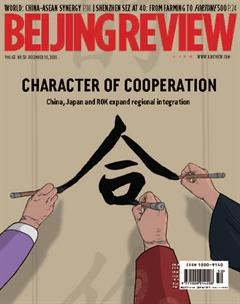Elbow-to-Elbow Progress
After cloud consultations during the outbreak of the novel coronavirus disease(COVID-19), in-person diplomacy is now resuming, as the situation in East Asia normalizes. State Councilor and Foreign Minister Wang Yis visit to Japan and the Republic of Korea (ROK) in late November indicates this, including his elbow bumps with senior officials in both countries, highlighted by the media.
It is also a significant overture to the new Japanese Government of Prime Minister Yoshihide Suga on the eve of a new administration to take power in the United States in January. Though Japan has traditionally been an ally of the U.S., its relations with China have strengthened with the Regional Comprehensive Economic Partnership(RCEP) signed in November.
China, Japan and the ROK, the worlds second, third and 11th largest economy respectively, together account for around 20 percent of the global GDP and foreign trade. Across the world, the trio has also shown the best performance among major economies in containing the pandemic. China, with its economic recovery, is forecast to be the first, if not the only, major economy to see positive growth this year. Against this backdrop, the trilateral trade and economic cooperation is significant, with its great potential. Especially with the RCEP, the three economies now have a greater mutual commitment to open one anothers markets wider and lower barriers.
Besides, the RCEP, signed after eight years of turbulent negotiations, raises hope for the conclusion of the free trade agree- ment (FTA) the three have been negotiating. It will lead to further trade liberation, regional integration and championing of multilateralism in the time of rising protectionism and unilateralism.
Historically, cooperation between China, Japan and the ROK has always been important for regional stability. Japans recent hosting of the Quadrilateral Security Dialogue with Australia, India and the U.S., and the new defense pact with Australia have created unease and Wangs face-to-face talks with Japanese leaders was a good opportunity to get a better assessment of how they might or might not impact Chinese and regional interests.
China and Japan should realize that they have a lot more in common besides trade, such as both going to hold different editions of the Olympic Games and both having committed to achieving carbon neutrality, China before 2060 and Japan by 2050. These are lofty goals that will be made easier to reach through cooperation. Wangs ROK visit resulted in immediate agreements on issues ranging from their under-discussion bilateral FTA to COVID-19 control and people-to-people exchanges.
With China and the ROK to celebrate the 30th anniversary of their diplomatic ties in 2022 and the ROK to host the 2024 Winter Youth Olympics, their cooperation has matured. Their readiness to start new dialogues, dock the ROKs development strategy with the Belt and Road Initiative faster, and launch cultural exchange years in 2021 and 2022 signal some of the positive results from Wangs visit.

